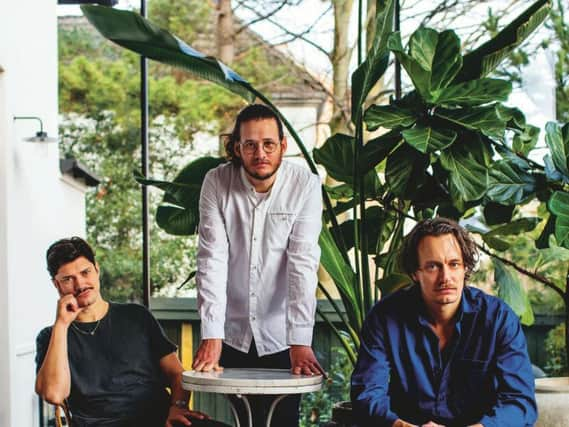Edinburgh International Festival: electronica band Efterklang reunites


It has been seven years since Danish electronica trio Efterklang released an album and five since they staged their mischievously titled ‘Last Concert’, the final flourish of the first flush of the band, which they filmed for posterity before immersing themselves in other projects.
Highlights of the last half-decade include co-composing an opera staged in a disused nuclear bunker in Copenhagen, launching their own radio station and label, and forming an indie rock jam band, Liima, with their Finnish drummer pal. Nice work if you can get it, and all fulfilling ventures for this most inquisitive and collaborative of bands.
Advertisement
Hide Ad“The thing about Efterklang is we have this talent for making ideas really big and complicated,” says their bassist, Rasmus Stolberg. “We have a nice little idea and before we know it we are on stage with nine people and instruments all over and videos and I don’t know what. It’s amazing but it can also be exhausting when you’re creating those projects and making them come to life. It becomes all-encompassing, and sometimes you just want to get in a room and jam.”
Relocating to Copenhagen in his late teens, he formed Efterklang with his childhood friends Casper Clausen and Mads Brauer. All of them were plugged into the emerging Nordic and German electronica scenes and they established their reputation with acclaimed albums such as Parades, Magic Chairs and, particularly, the haunting Piramida, for which they journeyed to the Svalbard archipelago to make field recordings in the abandoned Russian mining town of the same name.
Danish documentary filmmaker Andreas Koefoed captured their visit in The Ghost of Piramida, which the band made available for viewing via their private-public screenings initiative which allowed anyone to host an official screening party as long as they could muster at least five guests. On that occasion, 812 swell parties were had around the world.
Efterklang are brimming with such quirky, creative ideas that an invitation to work with Belgian Baroque ensemble B.O.X at their own festival in Antwerp must have felt like another day at the office. But the experience of utilising Baroque instrumentation in a contemporary songwriting context proved so fruitful that it superseded all other projects and ultimately led the trio back to Efterklang and their new album Altid Sammen.
“Suddenly all those other things didn’t feel so important,” says Stolberg. “We really felt this collective energy of making a proper Efterklang album again, and that means spending a lot of time in the studio working on songs and production.
“It was very much out of pure interest for the timbre and the sound and the possibilities of these instruments. We’re not educated in music in any way but I think it’s so important that new music is written and performed on these instruments.
Advertisement
Hide Ad“The whole modernist and avant-garde movement of the last century is very inspiring. But I also just believe in the pure fact of playing beautiful and interesting new music on any instrument, old and new. I don’t want to sound like I know what’s up because I don’t, but the scene is so vivid and alive when you dive into it.”
Working with B.O.X was influential in other ways, as the band were also inspired to try writing lyrics in Danish rather than English for the first time. “With your mother tongue, you have an incredible freedom to be flexible,” says Stolberg, “but because it’s closer to you, you also write deeper, more personal lyrics.”
Advertisement
Hide AdAs frontman, Clausen writes and sings all the lyrics with a soothing mellifluence over the band’s elegantly sculptured soundscapes. “I think he sings better in Danish and I don’t know why that is,” says Stolberg. “I don’t know if we’re going to keep up with Danish for future songwriting but I think we might. Of course, it’s a big doubt for us, how it’s going to work outside Denmark, but we’re giving it a go anyway.”
Efterklang’s overseas fans have already absorbed Danish whether they know it or not – the band’s name means “reverberation” or “remembrance.” Altid Sammen means “always together” which ostensibly refers to the core trio but has wider resonances for Stolberg. “Every human being is searching for love, safety and peace. We basically all want the same and we are also all connected in terms of making it work out. If you look at global problems, we have to fix them together.”
For unlimited access to The Scotsman Festival Coverage click HERE. Efterklang will do their bit for harmony when they unveil their new seven-piece live line-up at the Edinburgh International Festival. Stolberg, whose aunt and cousin live in the city, is looking forward to unleashing the organic joys of this (relatively) simple set-up. “At first I was thinking we don’t really have a show, but now I realise we do. It’s based on playing music together for people.”
Efterklang, Leith Theatre, 23 August, 0131-473 2000/www.eif.co.uk
